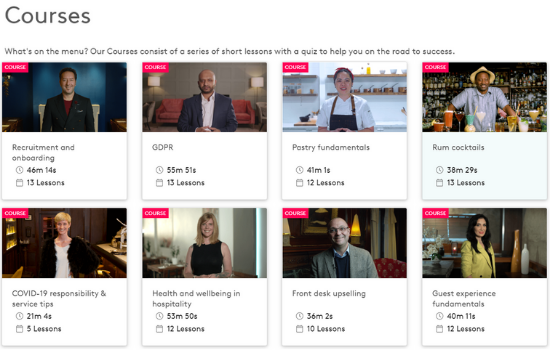What is the difference between up-skilling, multi-skilling, and cross-skilling? They all describe ways of expanding your skill set, but each has a distinct and specific purpose that can help you get ahead in different ways.
In today’s blog post, we’re looking at what these mean, how you can use them, and some top tips for developing professional skills.

You already know that learning new skills is an important part of progressing your career, but did you know that there are different types of skill development that suit different needs?
Up-skilling, multi-skilling and cross-skilling each have something unique to offer you (and your resume!). Read on to find out more.

Learning new skills shouldn't be time-consuming or difficult. When you and your team learn with Typsy, you gain access to bite-size video lessons on everything from cocktail recipes to marketing - all from your smartphone.
Learning with Typsy is practical, effective, and fun! And best of all, you can access Typsy's 800+ lessons as and when it suits you. Learn your way - starting today.


Up-skilling
This is improving on a skill you already have, or learning a new aspect of that skill.
For example, if you’re an up-and-coming chef and take our Mise en place course, you’ve updated your skills within the culinary field to include an in-depth understanding of mise en place strategies and practices. You’re now more highly skilled in that area.
How does this help me at work?
This one’s pretty obvious – the more skilled you are at your job, the more respected you are by colleagues and managers and the more likely it is that you’ll progress in your career.
Being highly skilled in one area means you have the opportunity to develop a more nuanced understanding of the role and its challenges – and gives you a stronger foundation from which to face those challenges.
Multi-skilling
This is having skills in related areas: developing several skills which complement each other and, when used at the same time, make you overall more efficient and proficient at the task at hand.
For example, if you’re a barista, you could also learn how to make cocktails.
How does this help me at work?
Having a wider variety of related skills will help improve your job prospects and broaden your opportunities, because you’re skilled at more than one thing.
It also allows you to become more innovative with your main skill – you might take a technique you learn from a cocktail recipe and apply it to a hot beverage recipe to create a new, standout drink for your venue.
Cross-skilling
This is combining skills from different areas to make you a more well-rounded professional. Cross-skilling can also allow you to approach problems with a new perspective.
Have you ever heard the saying, ‘to a hammer, everything looks like a nail’? It describes how you approach problems when your skills are mainly in one area – if you’re used to completing tasks a certain way, it’s very difficult to break away from that mindset or habit.
But if we modify the hammer so that it can also dispense glue, the hammer now has another way of solving problems. It can hammer in a nail, or it can stick things together: two different approaches that suit different problems. This is cross-skilling.
For example, if you’re a server, having some knowledge of things like how long different drinks take to prepare, your venue’s sustainability practices, or food allergens can make you a more careful and autonomous worker, with higher attention to detail.
How does this help me at work?
No matter your job position, the more aware you are of everything going on in your venue, the better you’ll be able to perform your duties.
That’s true for every position in every type of hospitality venue: it means you can anticipate your co-workers needs, help come up with innovative solutions, and provide a more seamless experience for your guests.
How to use strategy to up-skill, multi-skill, or cross-skill
Make a plan
Figure out what you already know, and then think about where you want to go. Do you have every skill you could possibly need to get you there? If not, you need to think about up-skilling, cross-skilling, or multi-skilling.
To decide what you want to prioritize right now, start thinking of skills as opportunities. What kind of opportunities do you want open to you in the future? If you'd like a promotion in the field you're already in, think about what new skills you could learn to help you stand out from the crowd.
Online learning is by far the most convenient, flexible and efficient way to improve your skills in any area of hospitality. Whether you're just dipping your toe in the water or you're ready to dive in head first, you can make training work for you - not the other way around.
With an app, you can access lessons any time you like - right from your smart phone. On a break and need a refresher on a skill before you go back? Simply jump on the app. All it takes is five minutes, any time and anywhere you like.
Practice makes perfect
Last but never least, getting your hands dirty is the best way to improve on a skill you're developing - and it shows managers and employers that you're prepared to get stuck in.
Using Typsy to give yourself a good foundation, start practicing your new skills today. And share your achievements around!
Have a hospitality question? Talk to us at typsy.com.
You might also like: